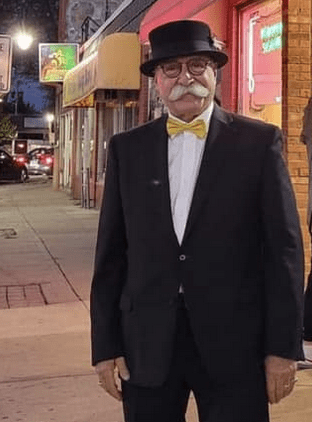Search Posts
Recent Posts
- Edible Gardens: Tips and tricks to planting the perfect garden – Mary Hunt May 25, 2025
- Ask Chef Walter: Cheese myths in the American table – Chef Walter Potenza May 25, 2025
- What To Do With Dead Squirrels. A short story by Michael Fine May 25, 2025
- Gimme’ Shelter: Sundae waiting at the Providence Animal Control Center May 25, 2025
- Rhode Island Weather for May 25, 2025 – Jack Donnelly May 25, 2025
Categories
Subscribe!
Thanks for subscribing! Please check your email for further instructions.

Homeless in RI: Street Sights (by and for homeless), Woonsocket plan, W. Warwick…
Activities of Daily Life, Mental Health, and Homelessness – Street Sights – by Antonietta Kies, and Janice Luongo, Street Sights – special to RINewsToday
Preparing food. Getting around. Dressing. Maintaining good hygiene. We all need to perform these everyday activities, and more, in order to survive and be safe. Most of us perform these activities without a thought, which makes them seem simple and routine; over time, we become accustomed to the complexity of these activities, through habit. In its “Activities of Daily Living [1]”, The National Library of Medicine names six categories that classify basic Activities of Daily Living (ADLs): “Ambulating, feeding, dressing, personal hygiene, continence, and toileting [1].” Most people can perform activities within these basic categories without difficulty. Alongside these basic categories, there exist more complex activities called “Instrumental ADLs (IADLs)”: transportation, managing finances, shopping, meal preparation, housecleaning/home maintenance, managing communications with others, and managing medications [1].” IADLs concern a person’s autonomy and their ability to be a part of a community.
The terms “ADL” and “IADL” date back to 1950, when they were introduced by physician and educator Sidney Katz[2]. These terms are most commonly used in the context of senior care, and according to mcnightsseniorliving.com, in 2016, one in five adults aged 85 and older needed help with ADLs [3]. What is the consequence of struggling with ADLs and IADLs? Seniors (and others) might need to rely on family for help: either living under a family member’s care, or receiving frequent visits for assistance. If they do not have a family member who can provide care, they may need to move into assisted living or employ a full- or part-time caregiver in their home. Since these options, especially the latter, can prove costly, supporting those who need assistance with ADLs/IADLs can be a challenge.
However, not all difficulty with ADLs is based on physical and mental changes due to age. Research and personal anecdotes have shown that mental illness, neurodivergence, learning disabilities, and neurological trauma also make ADLs and IADLs more difficult. For example, the National Alliance on Mental Illness reminds us that a common symptom of major depression is “hygiene indifference [4]”: a state of depression where hygiene doesn’t seem to matter or requires so much mental energy to maintain that a person ceases to practice it. ADHD, a neurodivergence, is linked to difficulty in managing finances [5]; people with ADHD might make impulsive purchases, or be disorganized to the point that their finances suffer.
Bipolar disorder may involve manic episodes that lead to impulsive, financially devastating purchasing. The learning disability dyslexia might make reading and filling out official documents and contracts a challenge. Traumatic brain injuries can lead to new mental illnesses, “perceptual impairments, cognitive problems, and communication problems [6],” which can affect a person’s ability to accomplish ADLs like shopping, housekeeping, and bathing. A mentally ill person’s failure to take their prescribed medications can impact their ability to perform ADLs; there are numerous reasons for such non-compliance, including the feeling that one’s wellbeing “doesn’t matter,” and substance abuse, which has a bidirectional relationship with mental illnesses. According to the Journal of the American Medical Association, “37% of alcohol abusers and 53% of drug abusers also have at least one serious mental illness, [7]” and “of all people diagnosed as mentally ill, 29% abuse alcohol or drugs.”
What does this all mean for people who are unhoused?
It means that people already coping with ADL difficulty may face even more ADL-related challenges upon becoming homeless: they may be without access to toilets or personal hygeine equipment, allowing the three ADLs of toileting, bathing, and hygiene to suffer. A person may be physically and mentally capable of performing the ADL of eating, but this can be a challenge when there is no food available. Others may have trouble accessing and refilling the mental health medications they need, which can compound difficulty with other ADLs. Now, imagine a person who, all that the same time, is homeless, is a senior who already needs ADL assistance, and lives with a mental illness or disability.
Everyone, not only those who struggle with ADLs, needs a support system: financial, emotional, and physical. Can we do better to educate ourselves on the conditions of homelessness, seniority, and mental illness, so that we have more empathy for our neighbors and loved ones who cope with them? Can our empathy lead to better policy decisions and increase the public’s understanding of these issues?
[1] https://www.ncbi.nlm.nih.gov/books/NBK470404/, last updated 2023.
[2] https://www.webmd.com/a-to-z-guides/what-are-activities-of-daily-living
[3] https://www.mcknightsseniorliving.com/news/cdc-more-than-20-of-85-adults-need-adl-assistance/#:~:text=Data%20from%20the%202016%20National,74%20needed%20help%20with%20ADLs.
[4] https://www.nami.org/complimentary-health-approaches/hygiene-indifference-the-symptom-we-dont-talk-about/#:~:text=However%2C%20indifference%20to%20hygiene%20tasks,health%20conditions%20(particularly%20depression).
[5] https://chadd.org/for-adults/managing-money-and-adhd/
[6] https://www.acquiredbraininjury-education.scot.nhs.uk/impact-of-abi/activities-of-daily-living/brain-injury-and-impact-on-adls/#:~:text=A%20significant%20injury%20to%20the,Work%20and%20education%20activities.
[7] https://www.helpguide.org/mental-health/addiction/substance-abuse-and-mental-health
___
On October 10, 2024, people around the world will recognize the 15th annual World Homeless Day, while working to prevent and end homelessness and alleviate the suffering of those experiencing it.
History of World Homeless Day – The concept of ‘World Homeless Day’ emerged from online discussions between people working to respond to homelessness from various parts of the world. The Inaugural World Homeless Day was marked on the 10th of October 2010. Since its founding, World Homeless Day has been observed on every continent (except Antarctica), in over 100 countries. Use of the idea of ‘World Homeless Day’ is open for all to use… anywhere in the world.
___
West Warwick – success, one person at a time
The local Town Council did not approve the proposed ordinance on encampments, but sent it back for a rewrite, thinking it should not have criminal penalties attached. Local advocate, Vin Marzullo, a West Warwick resident and former Executive Director of the DaVinci Center/Providence; Founder/USA Compassion Corps; AmeriCorps/VISTA (former RI Director); AARP RI Past President; Senior Agenda Coalition of RI member; and Hasbro Children’s Hospital/volunteer testified before the Council as they consider their next steps – he shared it with RINewsToday:

“THE GOOD NEWS: On Friday afternoon I was notified that Linda, and her son were placed in a Providence apartment.
We must thank Wendy at HEZ, the Thrive staff, WW Fire Chief Jeff Varone, Council President David Gosselin, and other advocates who aided this situation and demonstrate that West Warwick does have “better angels”. I had shared last week’s experience every day to advocate for Linda and her son – however, it was Wendy, Thrive, and other on-scene caseworkers that were able to identify and place them.
Besides testifying last Tuesday night before the West Warwick Town Council to oppose the hastily drafted Town Ordinance that would criminalize homelessness, I had a thoughtful, productive conversation with the Fire Chief later that evening – as well as conversation on Thursday with the VP Councilwoman Maribeth Williamson. It now appears that West Warwick may be more inclined to follow the recent example of Woonsocket in addressing the unmet needs of our community’s homeless population.
We certainly need to support a more responsive, responsible, and humane approach to this perplexing statewide problem. The residents and taxpayers have every right to be angry and frustrated — the system, public officials, and politicians have failed in their duty to the most vulnerable for many years – and have neglected for 7 years the legal mandate of the “Interagency Council on Homelessness”.
To turn this around, we must function as a collaborative community with the full and active support from our State government, faith-based community, service providers, the municipalities, and individual citizens. Hopefully, new efforts in Woonsocket and perhaps West Warwick will provide a path-forward for a homeless-free RI. Please continue to advocate loudly and often!”
___
Palm Beach County, FL
Homelessness now illegal – community fears it is not ready to handle the influx as it takes up to 90 days to get an emergency bed
___
Memorial Hospital
Still under private ownership – now being grafittied and with broken windows. City says there is no update – but an effort to prevent grafitti and damage is underway.
___
Woonsocket
Spirit of Hope is a volunteer, faith-based group that supports the homeless across several communities. they presented the plan Woonsocket is hoping to adopt to address homelessness in the greater Woonsocket area. Mayor Christopher Beauchamp and the Woonsocket Community Partnership Task Force released a new report highlighting the challenges and potential approaches to tackling homelessness in the city. The plan will center on the “Dignity Bus” which has funding for 9 months upcoming. The plan is being called “great” and “terrific” and “compassionate” – you can review it here, in its complete form:
–
